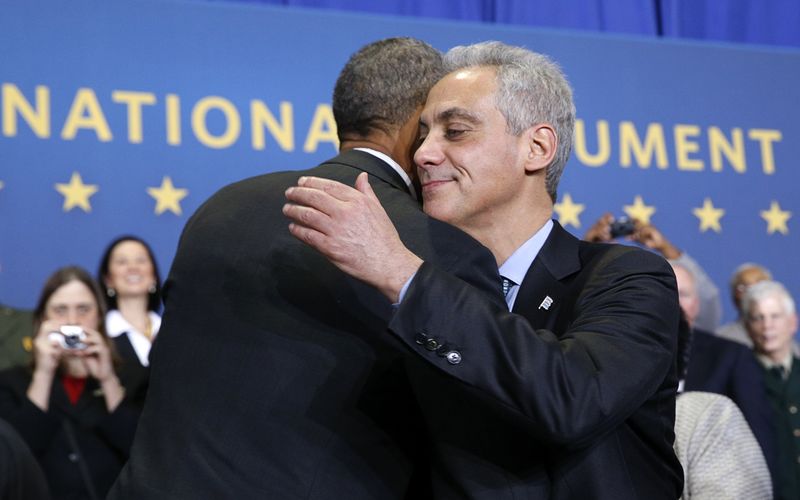By Fiona Ortiz and Mary Wisniewski
CHICAGO (Reuters) - Chicago Mayor Rahm Emanuel is hoping his warm hug with President Barack Obama in the last days of his re-election campaign will help him avoid a run-off in the race to lead the financially troubled, third largest city in the country.
Chicagoans cast votes for mayor and for aldermen on Tuesday and polls show Emanuel in danger of closely missing the 50 percent needed for an outright win, even though his massive campaign chest has allowed him to saturate the airwaves.
His most recent ad showed him hugging Obama, who visited his home city last Thursday and praised Emanuel's "smarts" and "toughness." The former Obama advisor has brought business investment to Chicago but has had to fight off perceptions he is uncaring about the city's have-nots.
The race has pitted big-money Democrat Emanuel - whose campaign donors include Hollywood directors and hedge fund executives - against a progressive Democratic challenger, County Commissioner Jesus "Chuy" Garcia, who has struggled to raise funds.
A run-off would mean six more weeks of campaigning for Emanuel against the second-placed candidate, almost certainly Garcia. Three other candidates - an alderman, a businessman and a perpetual also-ran - are well behind in polls.
After making unpopular choices earlier in his four-year term to shut down dozens of underpopulated schools in poor areas of the city, Emanuel has turned more attention to lower income residents as the election loomed, passing a city ordinance to raise the minimum wage.
He has also billed himself as the only candidate who can make tough decisions to rein in the city's budget deficit, expected to balloon to $1.2 billion by next year due to a legally mandated jump in payments to public pensions.
Emanuel, 55, is a former U.S. Congressman who became Obama's first White House chief of staff, leaving that post in 2010 to run for mayor of Chicago. He is known for his sometimes abrasive style and is seen as cold and uncaring by many Chicagoans. But in tough financial times, he has sought to turn that to his advantage, arguing he has the personality to make hard choices.
GARCIA'S MOMENTUM STALLED
Garcia launched his mayoral bid late last year and vaulted quickly into second place, but has failed to further build momentum. Most of his campaign events are small and polls show he will take about 20 percent of the vote.
Many trade unions endorsed the incumbent, who has overseen major infrastructure projects, while Garcia was not able to win many union endorsements, even from public sector unions wary of Emanuel trying to cut the budget for their pensions.
The only union to put serious money into Garcia's campaign was the powerful Chicago Teachers Union, whose leader, Karen Lewis, had planned to run for mayor but backed down when she was diagnosed with a brain tumor.
Rebecca Patrick, 31, adjunct professor at City Colleges, said she transferred her planned vote for Lewis to Garcia. "It's not a great reason to vote for somebody but I thought if he had her support, and I was impressed enough with his credentials, ok."
Garcia has been hugely outspent by Emanuel, who had $6 million in his war chest as of Dec. 31, even after spending $4.7 million in the fourth quarter.
Garcia, in comparison spent $60,000 in the fourth quarter and ended the period with $817,000 in his campaign fund. He held back on television advertising until February.
But some voters are turned off by the big-money support for Emanuel.
"I think it's telling that a lot of his financial support is coming from outside the city," said Robert Schultz, 60, who cast his ballot for Garcia in early voting, which ran from Feb. 9-21.
Emanuel clearly sees Garcia, 59, as his biggest threat, focusing his negative ads on him. Garcia, who has been a state senator and an alderman, attacked Emanuel for failing to put more police on the streets and for tax breaks for corporations.
Both candidates have to contend with voter apathy.

"I don't hate Emanuel. I do like Garcia," said Amariah Bradford, a marketing student who said he would not vote. "Ultimately, I think it doesn't make a difference."